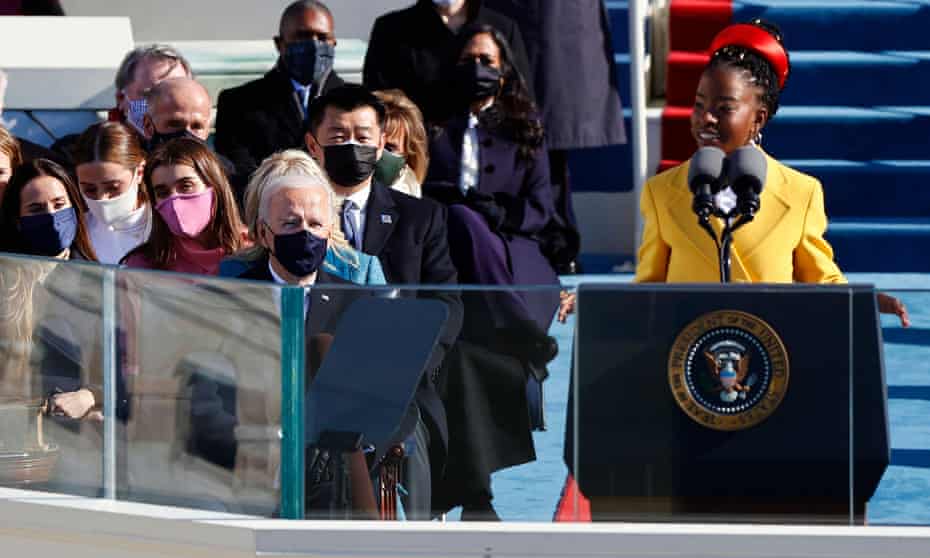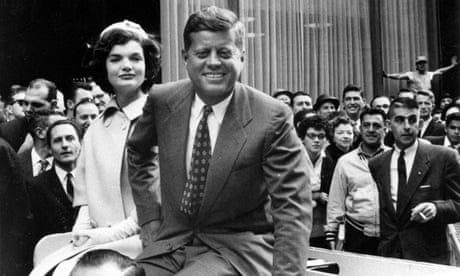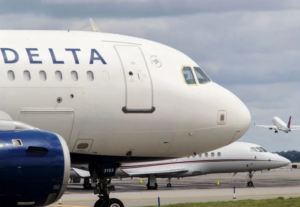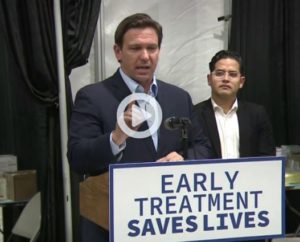
The president does not just share Irish roots with John, Robert and Ted Kennedy – he also wants to lead America in the world
It was a popular Washington sport: find the past president who best explained Donald Trump. There was a touch of Andrew Jackson’s populism, a dash of Richard Nixon’s skulduggery, a sprinkling of Ronald Reagan’s myth-making. But now all that is over, who are the closest matches to Joe Biden?
A huge portrait of Franklin Roosevelt hanging in the Oval Office makes the obvious connection between two men who inherited epochal crises and prescribed epochal remedies. But the room’s other contents suggest an affinity between the oldest man ever elected president and the youngest: John F Kennedy.
Biden keeps a photo of himself meeting Pope Francis behind his desk, leaving no one in any doubt he is the second Catholic president. Kennedy was the first. Biden displays a bust of Robert F Kennedy, the 35th president’s brother and attorney general, beside the fireplace. The Oval Office also contains a 332g moon rock brought back by the Apollo missions, the posthumous realisation of Kennedy’s dream.
So it was that in his first prime time TV address, last week, Biden pivoted from the coronavirus pandemic to exult in America landing a rover on Mars. He did not add that China, which last month put a spacecraft in orbit around the red planet, intends to put a rover on the surface too. A space race is under way between two global superpowers. Sound familiar?
“It is very hard to exaggerate how much all of JFK’s beliefs and policies were shaped by the cold war,” argues Lawrence Haas, author of a new book, The Kennedys in the World: How Jack, Bobby, and Ted Remade America’s Empire. “In the case of space, he was far less interested in the magic of space than he was in losing the space race to the Soviets.
“He greatly feared the impact of Soviet advances on America’s competition with the Soviets for influence throughout the developing world. This was a time when countries and peoples across several continents were choosing sides: whether to be loyal to freedom and democracy and through that to the United States or communism and through that to the Soviet Union.
“JFK obsessed over America’s image in the world. He took office when the United States was behind the Soviets in space and he agonized over it, certainly through 1961 and didn’t begin to relax about it until at least 1962 and then into 1963 when we were really making advances in the aftermath of his announcing the goal of landing a man on the moon and bringing him safely to earth by the end of the decade.”
In a 1962 memo to his vice-president, Lyndon Johnson, who chaired the National Space Council, Kennedy asked if America had a chance of beating the Soviets. Haas adds: “Whether it was space or civil rights or a whole variety of other domestic issues, JFK crafted them through the prism of foreign policy in general and the cold war in particular.”
‘An alternative model of governance’
Kennedy, a former senator, became president aged 43 at an inauguration featuring Robert Frost. Sixty years later to the day, Biden, a former senator, became president aged 78 at an inauguration featuring Amanda Gorman. Both poets sought to project optimism about the future but inherited a sense of American hegemony under existential threat.

Haas, a former communications director for Vice-President Al Gore, says: “There are parallels to the times. When Jack was elected, the world was bifurcated and two superpowers were competing for influence with two different visions of governing philosophy: US-led freedom and democracy, Soviet-led communism. Today the United States faces a similar challenge of sorts that I think Biden understands.
“Just like we were challenged by the Soviets, we are being challenged right now by the Chinese in the aftermath of the great recession of 2008 and a variety of other problems that the west has faced in recent years. The Chinese are promoting an alternative model of governance that they say will create more prosperity and is more efficient and sounder for the future.
“Not coincidentally, as the Chinese have aggressively promoted this style of governance far beyond their borders, we have not promoted freedom and democracy around the world in recent years as aggressively as we had in earlier periods. And while our reluctance to do so was particularly acute under President Trump, President Obama did not promote freedom and democracy very consistently either and the freedom agenda of George W Bush ran out of steam around 2006, 2007.”
Haas notes that the nonprofit organization Freedom House just reported that freedom around the world has declined for 15 straight years. Biden has declared “America is back” at the head of the table, though sceptics of the US’s cheered history of adventurism question whether that is necessarily cause for celebration.
Bur Haas, a senior fellow at the American Foreign Policy Council, insists: “When the United States does not promote freedom and democracy, all else being equal, it leaves more room for the autocrats to roam free and to assert their model of governance without challenge. Joe Biden seems to understand this and in fact has been promoting freedom, democracy, human rights and other important values in his short time in office.
“He has criticized Beijing for its activities in Hong Kong and its treatment of the Uyghurs. He criticized Moscow for its treatment of Alexei Navalny and the protesters and he is promoting human rights elsewhere. So I think he understands that we’re in a period where freedom is being challenged in a way not dissimilar to the way it was challenged at the height of the cold war when Jack Kennedy was president.”
‘To care about the world’
Kennedy, who was of Irish ancestry, also faced domestic hurdles when he ran for president in 1960. Anti-Catholic prejudice was rife and had the potential to make him unelectable, eventually forcing him to address the issue directly in a speech to newspaper editors. Decorating his Oval Office with a photo of the Pope would have been unthinkable, though he did visit Ireland in June 1963.
Six decades on, when Biden sought the White House, he made much of his Irish roots but his faith was barely discussed. Stephen Colbert, a comedian who is Catholic, told Biden: “I’m surprised more hasn’t been made of the second Catholic president. It’s significant, certainly, to me.” The president-elect replied that the Pope had personally called to congratulate him.
Haas reflects: “The issue of Catholicism is night and day different. In 1960 Jack Kennedy needed to confront it and to assure a largely Protestant country with a sizable Catholic population that he wouldn’t be taking orders from the Pope, Catholicism would not interfere with his public policy making and he understood the role of the presidency. I don’t recall the issue ever coming up in any public forum in 2020 and I watch politics pretty closely, so that’s that’s very different.”
Haas makes a case that all three Kennedy brothers – Jack, Bobby and Ted – played an outsized role in US foreign policy. Remarkably, at least one held elected office from 1947, when Jack took a seat in the House, until 2009, when Ted, a senator, died from brain cancer.
“The untold story about them is that they were raised not just to attain power but they were raised by Joe, their ruthless and demanding father, and Rose, their cold and distant mother, to look abroad, to learn about the world, to care about the world and, once they attained power, to reshape America’s place in the world, and they each they each did so.”
When the trio was growing up, dinner in the wealthy Kennedy home was a distinctly highbrow affair. Ted is quoted in the book as saying: “We learned early that the way to be an active part of dinner conversations was to have read a book, to have learned something new in school, or, as we got older, to have travelled to new places.”
Haas continues: “They each travelled widely. They each served as foreign correspondents for news outlets and wrote dispatches back home and positioned themselves as global thinkers. They each wrote with an enormous sophistication about history and people and culture and ideology and, when they attained power, they each exerted enormous influence over the course of America’s role.”
‘Enormous influence’
Jack and Bobby were assassinated in 1963 and 1968 respectively. Ted went on to a long career in the Senate and was best known for domestic achievements in civil rights, worker rights, education and healthcare. But Haas believes his sway over international relations has been underestimated.

“Ted, in the aftermath of Bobby’s death, exerted enormous influence on virtually every major foreign challenge that the United States faced,” he says. “As a member of the Senate his achievements are really quite breathtaking. He set the stage from his writings and his speeches for a new US outreach to communist China, which Nixon and [Jimmy] Carter later pursued.
“He built the opposition to Reagan’s proxy wars with the Soviets and Latin America. He spearheaded Congress’s override of Reagan’s veto of sanctions against South Africa over apartheid, which was the first congressional override of a president on foreign policy in 11 years. He played a major role in bringing peace to Northern Ireland and he led the opposition to the US invasions of Iraq and, while he didn’t look like much of a visionary after the 1991 war, he looked like very much of a visionary after the 2003 war.”
Ted was elected at 30 to a seat formerly held by Jack and spent the next 47 years in the Senate. Biden was elected at 29 and spent 36 years in the chamber, regarding Ted as a mentor. When news of Ted’s death broke, Biden, then vice-president, said: “He restored my sense of idealism and my faith in the possibilities of what this country could do … To paraphrase Shakespeare: I don’t think we shall ever see his like again.”
Source: https://www.theguardian.com/us-news/2021/mar/21/joe-biden-kennedys-us-foreign-policy





